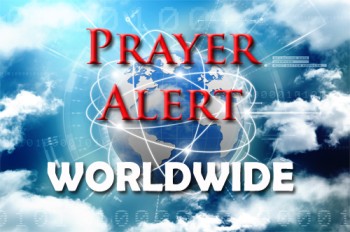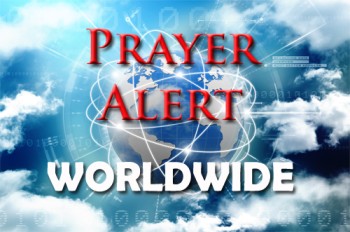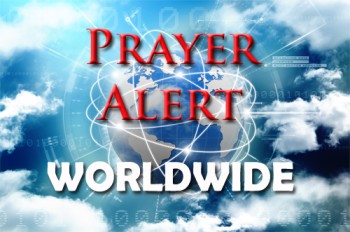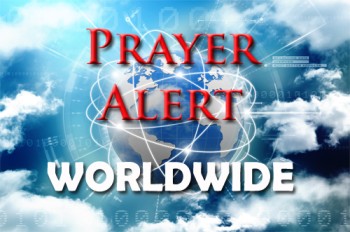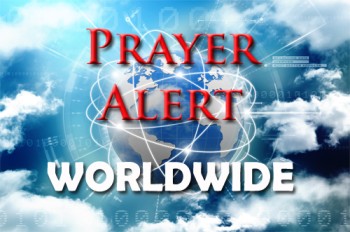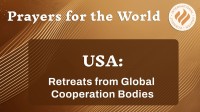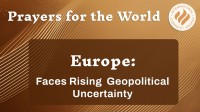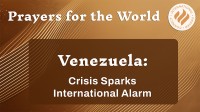
Middle East: Trump and Netanyahu meet as Iran talks continue
Rising tensions in the Middle East frame a significant meeting between Donald Trump and Benjamin Netanyahu in Washington. Israel is seeking a comprehensive agreement restricting Iran’s nuclear programme, missile development, and support for regional proxy groups, while Iran has signalled willingness to limit nuclear activity in exchange for sanctions relief but rejects broader demands. The USA has increased military presence in the region, warning of possible strikes if negotiations fail, yet leaders on all sides are continuing the dialogue. Iran’s position has been weakened by the huge recent protests, while Israel fears a deal that leaves long-term threats unresolved. At the same time, the Trump administration is pressing Israel and Hamas to implement the next phase of their ceasefire agreement in Gaza, with accusations of violations and little progress towards reconstruction.
Venezuela: president says no to new presidential election
The president of Venezuela’s national assembly, Jorge Rodríguez, has said no presidential election will take place soon, stressing that the government’s priority is national stability. Following the controversial 2024 vote and the abduction of president Nicolás Maduro by the USA, vice president Delcy Rodríguez is now acting president. Authorities say they must rebuild institutions and reach agreement with opposition groups before setting an electoral timetable. A proposed amnesty law aims to release political prisoners and encourage reconciliation, though critics fear repression may continue in other forms. The re-arrest and house arrest of opposition figure Juan Pablo Guanipa has intensified concerns about civil liberties, while opposition leaders question whether genuine political participation will be allowed. The situation reflects a nation seeking normalcy amid deep division, uncertainty, and competing claims of legitimacy, highlighting the fragile path toward democratic stability and lasting reconciliation.
Japan: prime minister’s social media led to her party’s landslide victory
Growing social media interest in prime minister Sanae Takaichi appears to have significantly influenced Japan’s lower house election on 8 February, contributing to a decisive victory for her Liberal Democratic Party. Many voters reported seeing daily clips of her speeches and travel despite chronic illness, creating familiarity and sympathy. Her personal X account gained far more followers than other party leaders, with spikes occurring even during controversy over a missed debate due to medical treatment. Supporters’ viral posts often countered criticism, amplifying positive perceptions. On YouTube, campaign-related videos featuring Takaichi attracted extraordinary engagement, including an advertisement viewed over 150 million times. Independent creators further boosted her visibility, producing most election-related content online. Exit polls showed nearly a quarter of voters relied primarily on social media when deciding how to vote, with strong shifts toward the ruling party among them. Online popularity appears to have translated directly into ballots cast.
USA: Trump puts up racist video, deletes it later
A social media video shared by Donald Trump and later deleted drew widespread condemnation across political lines. The clip promoted false election claims and, near its conclusion, depicted Barack and Michelle Obama with their faces superimposed onto dancing apes. Posted during Black History Month, the video revived racist imagery historically used to justify slavery and segregation. The White House initially defended the post as a meme but later said a staff member had shared it in error. Politicians (including some Republicans), diplomats, and commentators criticised the content as dehumanising and harmful. Analysts noted that such inflammatory behaviour might not significantly affect Trump’s political support because public opinion around him is already polarised. One commentator said, ‘That Trump chose to post this video is yet another indicator of how reactionary racism has become mainstream and normalised within his Republican party, as the GOP continues to lurch dangerously rightwards.’
Zimbabwe: cabinet approves extending president’s term till 2030
Zimbabwe’s cabinet has approved constitutional changes that could extend president Emmerson Mnangagwa’s rule until 2030, sparking strong opposition concern. The proposals would lengthen presidential terms from five to seven years and allow parliament, rather than voters, to choose the president. Supporters say the measures would ensure political stability and continuity for development programmes, but critics argue the reforms undermine democratic processes and require a national referendum. Since coming to power in 2017, Mnangagwa has faced growing scrutiny from civil society groups who fear weakening constitutional protections. He has presided over a collapsing economy which has suffered hyperinflation and unemployment, undermined by alleged corruption and cronyism. The opposition, fragmented and weakened after years of repression, has failed so far to mount significant resistance to the proposal.
“The prayer of a righteous person is powerful and effective.”
– James 5:16
We are pleased to bring you the February edition of IPC Connections!
It really is a joy to have you with us as we seek to be ‘Exalting Jesus, catalyzing united prayer for Kingdom transformation of peoples, cities and nations’.
We trust that you will be blessed and encouraged as you read the articles, news and resources info this month.
We would encourage you to see Dr Jason Hubbard’s new year’s message video HERE
As we launch into 2026, our prayer is that our worldwide IPC family will continue to press in with faith and unity.
This is not a year for retreat, but a year for acceleration!
With gratitude, vision, and hope, let’s step forward together to exalt Jesus through united prayer.
Global Day of Prayer for Buddhist Peoples - 17th February 2026
We invite you to join millions of believers from churches and Christian ministries around the globe, as we unite for 24-hours of prayer for Buddhist Peoples.
 This will be an opportunity to pray together, exalting Jesus Christ as King throughout the Buddhist world, asking the Lord of the Harvest to send forth laborers to every unreached Buddhist people group!
This will be an opportunity to pray together, exalting Jesus Christ as King throughout the Buddhist world, asking the Lord of the Harvest to send forth laborers to every unreached Buddhist people group!
We have produced a Prayer Guide that is available in multiple languages online HERE
We are encouraging everyone to pray where they are - at home, at church, at cell groups, at work or in houses of prayer! Pray solo, in couples, as families, and devote some time in worship and prayer, upholding Buddhist peoples in 7 key cities and regions of the world.
Our Global Family 24-7 Prayer community will be praying with us across the 24 hours.
Register to join them online HERE
Jon Shabaglian, leader of Psalmist Mission has written an awesome anthem for the Day of Prayer entitled ‘Tsunami’. Read more about it below!
Let's be praying for Kingdom breakthrough across these key Asian cities, the USA and the wider Buddhist diaspora!
7 Days of Prayer for Buddhist Peoples - 10th-16th February, 2026
 Launching this coming Tuesday! - we invite you and your families, contacts and networks to join us as we pray for 7 days, in the lead up to the Global Day of Prayer - for Great Commission breakthroughs across the Buddhist World.
Launching this coming Tuesday! - we invite you and your families, contacts and networks to join us as we pray for 7 days, in the lead up to the Global Day of Prayer - for Great Commission breakthroughs across the Buddhist World.
To guide your prayers, IPC colleagues have researched and written an adult prayer guide entitled ‘Until the Light Breaks Through’ that has been published in 30+ languages (online), free, from the 110 Cities website. It’s a brilliant resource. The IPC Media Team have published a companion Childrens Guide entitled Listen - Live – Love that includes songs, daily stories and ‘Justin’s Thoughts’ written by Justin Gunawan.
This will be the first of our 5 worldwide days of prayer for 2026! – Watch this Intro Video!
 Editorial – ‘Jesus be our Fix in 2026’ - Dr Jason Hubbard
Editorial – ‘Jesus be our Fix in 2026’ - Dr Jason Hubbard
We would encourage you to read this month’s Editorial article entitled ‘Jesus be our Fix in 2026!’.
As International Prayer Connect steps into 2026, Dr Jason Hubbard calls the global IPC family to fix their eyes on Jesus, steward their words and walk in the fear of the Lord, as we believe for a year of supernatural increase, for God’s Glory!
Read it below or download it HERE
Regional Update
IPC’s 24 Regional Prayer Council leaders are regularly meeting to pray with their national and regional leaders, and to share news, resources and encouragements.
This last month, we facilitated a Global Day of Prayer for Iran through our Global Family 24-7 online community. The nation is a tinderbox that needs our ongoing prayers at this time. See prayer pointers below.
We are delighted to have recruited more than 23,000 subscribers for ‘Praying God’s Word – 365 Days of Prayers’ on the YouVersion Bible app! Do join us HERE!
 2BC’s next 24 hour Shine! Online initiative takes place this Tuesday 10th February!
2BC’s next 24 hour Shine! Online initiative takes place this Tuesday 10th February!
We will be praying for the vision of 2BC, for children and youth across Indonesia and for the success of the Light of the World movie and its Gospel vision.
Will you become an IPC Prayer Flame Partner?…
 “The fire shall ever be burning upon the altar; it shall never go out.” (Leviticus 6:13)
“The fire shall ever be burning upon the altar; it shall never go out.” (Leviticus 6:13)
This past year, your faithful prayers have been such a blessing to us - and for that, we’re deeply grateful.
As we look ahead in 2026, the opportunities before us are vast and urgent. To fully embrace this moment, we need a devoted family of monthly supporters to help keep the fire of prayer burning brightly across the nations - just as God commanded His altar fire never to go out.
That’s why we’re inviting you to become an IPC Prayer Flame Partner.
Your monthly gifts - no matter the size - will help sustain and spread this global movement of united prayer, ensuring that the flame on God’s altar of intercession never dies out.
We’ve made it simple and secure to give monthly online through PayPal. Every gift matters. Every prayer fuels the vision. Will you help keep the fire burning?
Click Here to support IPC monthly via PayPal, or visit www.ipcprayer.org/donate
Together, let’s keep the fire on the altar blazing - and see the world transformed by prayer!
The Power of People Group Thinking
IPC’s joint founder and former Director, John Robb has shared with us some useful resources, info and insights into praying for the remaining Frontier People Groups, along with an opportunity to download his latest book for free. Read more below.
With Grateful Thanks…
“The prayer of a righteous person is powerful and effective.” (James 5:16)
Thank you for your continued partnership with International Prayer Connect. Your prayers, passion, and perseverance are making an eternal difference.
You are part of a growing army of intercessors - lifting up the name of Jesus and contending for Kingdom breakthrough across the nations.
Together, we are lighting the fires of revival and preparing the way for the Lord (Isaiah 40:3).
May your heart be strengthened, your faith renewed, and your prayers filled with fresh fire from Heaven.
 Every blessing,
Every blessing,
Jason Hubbard - Director
International Prayer Connect
Disclaimer… The views and opinions expressed in IPC Connections and the articles on our website are those of individuals and our partner organisations. They do not necessarily represent the policies or views of IPC or its individual leaders.
We aim to respect the diversity within the prayer movement and yet embrace our unified calling to mobilise prayer for the nations. (2 Chron 7:14) If you wish to discuss the appropriateness of any articles, please contact us. If for any reason you do not wish to receive IPC emails in future, please click the unsubscribe link below.
Jesus, Be Our Fix in 2026: ‘A Year of Increase’ – by Dr Jason Hubbard
As we step into 2026, our cry is simple and focused: Jesus, be our fix in 2026! In a world filled with noise, distraction, fear, and competing voices, the call of God for this season is unmistakable - fix your eyes on Jesus, the author and perfecter of our faith (Hebrews 12:2).
Can we ask this year for an increase in the revelation and beauty of Jesus?
At the foundation of all true increase is this truth: Jesus must remain our singular focus. When Jesus is our fix, everything else finds its proper alignment. May he be our fix in 2026!
 A Key to Increase: Stewarding Our Tongues
A Key to Increase: Stewarding Our Tongues
One of the practical keys to seeing supernatural increase in our lives is learning to steward our tongues. How we speak about Jesus Christ - about others, and to one another - really matters!
We are living in a time of a civil war of words, a constant swirl of competing narratives amplified by media, technology, and artificial intelligence. Discernment in these days hinges on which voices we allow to shape us. This is a season marked by the ‘battle of the voice.’ Are we speaking words of life, or words of fear? Our words can build up or tear down, create hope and healing or despair and destruction, bring blessing or cursing, bring life or bring death (Prov. 18:21) through the power of our voice!
The Fear of the Lord
Psalm 34 invites us: “Oh, taste and see that the LORD is good! Blessed is the one who takes refuge in Him.” Those who fear the Lord lack no good thing. Scripture is clear about the promises attached to the fear of the Lord:
- It is the beginning of wisdom (Proverbs 1:7)
- It brings understanding and knowledge of God (Proverbs 2:5)
- It prolongs life (Proverbs 10:27)
- It brings confidence, strength, riches, honor, and life (Proverbs 13:13; 22:4)
- It helps us overcome sin (Proverbs 16:6)
- It releases divine protection—“The angel of the LORD encamps around those who fear Him” (Psalm 34:7)
The psalmist connects the fear of the Lord directly to the tongue:
“Come, my children, listen to me; I will teach you the fear of the Lord. Whoever of you loves life and desires to see many good days, keep your tongue from evil and your lips from telling lies” – Psalm 34:11-13
When the Tongue Blocks Increase
Our tongues participate in evil through lying and deception, gossip and slander, accusation, and complaining/grumbling. Scripture warns that grumbling kept Israel from entering the promised land (2 Cor. 10). These sinful tendencies hinder the increase of God’s blessing in our lives.
This calls for a moment of confession and consecration—yielding our tongues fully to the purposes of God.
 What Our Tongues Are Meant to Do
What Our Tongues Are Meant to Do
- Praise – “I will bless the LORD at all times; His praise shall continually be in my mouth” (Psalm 34:1).
- Thanksgiving – It is God’s will that we give thanks in all things.
- Prayer – Prayer in Jesus’ name increases divine activity on the earth.
- Honor and Blessing – Speaking life over one another builds the community of faith.
Praying in the Spirit: A Pathway to Increase
Scripture reveals that praying in tongues is a powerful gift given to the Church. When we pray in tongues, we speak to God, uttering mysteries by the Spirit (1 Corinthians 14:2). Our spirit prays beyond the limits of our understanding. Tongues function as prayer, praise, and thanksgiving,
The benefits of praying in tongues include:
- Increase in personal strengthening (1 Corinthians 14:4; Jude 20)
- Increase in Spirit-led prayer, praise and thanksgiving (Romans 8, I Cor. 14)
- Increase in effective spiritual warfare (Ephesians 6:18-19)
Praying in tongues is a gateway gift - a gateway to greater revelation of Jesus just as the apostle Paul experienced profound insight while speaking in tongues more than all the Corinthian church (1 Cor. 14:18).
History bears witness to this power. Jackie Pullinger, a young British woman, ministered in the darkness of Hong Kong’s Kowloon Walled City—one of the most lawless places on earth at the time. Through persistent prayer in the Spirit and speaking in tongues, God broke addictions, delivered lives, and demonstrated His power where human ability failed. As Jackie used to share, “God does not need our ability—He needs our availability”
Jesus Must Be Proclaimed as Supreme Lord and Reigning King
 Ultimately, may we proclaim the Supremacy of Jesus with our speech -
Ultimately, may we proclaim the Supremacy of Jesus with our speech -
- His absolute supremacy over all powers
- His lordship over nations, history, and every sphere of life
- His right to allegiance, obedience, and worship
Jesus is not merely the Savior of individuals, but the central hope for cities, cultures, and nations.
- He is God’s answer to injustice, idolatry, and broken systems
- Proclaiming Jesus includes declaring His reign over public life, not just private faith
- The gospel is global and historical, not just personal
As believers, let’s not just talk about what Jesus gives (forgiveness, peace, purpose, heaven) but also proclaim who Jesus is.
- Jesus is not merely the means to blessings - He is the ultimate message, the treasure, the King
- Our speech should exalt His person, glory, authority, and worth
- Proclamation flows from adoration
- Witness is strongest when it overflows from captivated hearts
- We speak because Jesus is worthy to be spoken of
 In summary, speaking about Jesus means:
In summary, speaking about Jesus means:
- Centering everything on Christ Himself
- Proclaiming His supremacy and reign
- Letting witness flow from worship
- Using language that magnifies His glory
- Declaring Him as the hope of the nations
- Calling people to allegiance, not convenience
- Praying for his exaltation that brings transformation across peoples, cities and nations
As we fix our eyes on Jesus in 2026, walk in the fear of the Lord, steward our tongues, yield ourselves fully to the Spirit, and exalt Jesus in everything we do, say, and pray, we will see a year of supernatural increase - for His glory and our joy.
A Prayer of Blessing for 2026 -
“We proclaim over our families that 2026 is crowned with the goodness of the Lord Jesus. We declare his peace within our homes, unity in our relationships, and divine purpose guiding every decision. May Joy increase, Strength be renewed, and God’s favor surround our households like a shield. As we welcome this year, we stand on the promise of Scripture: “You crown the year with Your goodness” (Psalm 65:11). This will be a year of victory, overflow of grace, and lasting testimonies of God’s faithfulness in Christ Jesus” - Yanira Gonzales, Clamor (IPC Latin America Prayer Council) Leader
For the Supremacy of Christ in all things,
Dr. Jason Hubbard – Director
International Prayer Connect

DOWNLOAD this article HERE
The United States’ decision to withdraw from more than sixty international organisations marks a profound shift in its engagement with global cooperation. The move affects a wide range of institutions linked to humanitarian aid, public health, climate coordination, development, and international governance - many of them connected to the United Nations system. Supporters frame the decision as a reassertion of national sovereignty and fiscal accountability. Critics warn it risks weakening collective responses to crises that no nation can address alone.
The withdrawals come at a time of extraordinary global fragility. Armed conflicts continue in regions such as Sudan, Ukraine, Gaza, and the Sahel. Climate-driven disasters are increasing in scale and frequency. Millions remain displaced, food insecurity is rising, and public-health systems in low-income countries remain vulnerable to outbreaks. International coordination has often been imperfect, but it has provided shared frameworks for early warning, humanitarian access, and advocacy for those with little voice.
Humanitarian agencies caution that reduced U.S. participation may create funding gaps, limit information-sharing, and weaken diplomatic pressure where protection of civilians is most urgently needed. Faith leaders have also expressed concern that disengagement from global institutions diminishes moral leadership on issues of justice, peace, stewardship of creation, and care for the poor.
For the Church, this moment calls for discernment rather than despair. Scripture reminds us that God remains sovereign over nations and history, even amid political change. As policies shift, the people of God are invited to pray for wisdom in leadership, perseverance in humanitarian work, and renewed compassion for those who suffer - trusting that God can still work powerfully through cooperation, advocacy, and faithful witness.
Prayer Pointers
1. Pray for Humble and Courageous Leadership
Pray that those entrusted with power would lead with bowed hearts, aware that every decision goes far beyond borders and headlines. Ask God to quiet arrogance, sharpen discernment, and anchor leaders in moral courage. Pray they would listen well, and pursue justice that protects the weak and steadies the world.
“Plans fail for lack of counsel, but with many advisers they succeed.” Proverbs 20:18
2. Pray for Humanitarian Cooperation and Protection
Pray that cooperation would prevail wherever human life hangs in the balance. Ask God to strengthen humanitarian organisations, guard aid workers from harm, and keep corridors of compassion open when politics threaten to close them. Pray that mercy would not be delayed, diverted, or denied to those suffering from conflict, hunger, disease, or environmental crisis.
“Blessed are the peacemakers, for they shall be called sons of God.” Matthew 5:9
3. Pray for the Vulnerable and Overlooked
Pray for communities most at risk of being forgotten - refugees without home, families uprooted by violence, the poor whose cries go unheard, and minorities pushed aside. Ask God to be their defender and provider, to restore dignity where it has been stripped away, and to raise bold advocates who will stand in the gap with truth and compassion.
“The Lord watches over the foreigner and sustains the fatherless and the widow.” Psalm 146:9
Summary Prayer
Faithful God, steady the hands of leaders and soften their hearts. Preserve life where it is most fragile, strengthen those who serve in dangerous places, and awaken Your Church to love with courage and integrity. Let justice outlast shifting powers, and let Your purposes stand firm through every season. Amen.
Read More
- AP News — U.S. withdrawal from international organisations
https://apnews.com/article/united-nations-trump-international-organizations-withdrawal-d704fb9b444dc9cf569865d391b544a6 - White House Fact Sheet — U.S. withdrawal announcement
https://www.whitehouse.gov/fact-sheets/ - UN response and analysis (PassBlue)
https://passblue.com
Europe is entering 2026 under intensifying geopolitical strain as Russia’s war against Ukraine persists, transatlantic relations face renewed stress, and security, energy, and economic pressures converge. Russia’s continued aerial and missile attacks on Ukrainian cities and critical infrastructure, including devastating blows to energy systems in sub-zero winter conditions - have deepened humanitarian hardship and underlined the war’s brutality. The conflict’s toll has spurred emergency responses, such as the European Commission mobilising additional funds to support Ukraine’s energy needs and the ongoing search for durable peace solutions, though negotiations remain fragile. (Reuters)
European nations are also confronting broader strategic uncertainty. NATO leaders acknowledge that ending the war will require difficult decisions, even as Russia asserts that foreign forces in Ukraine would be deemed legitimate targets, complicating deterrence and defence planning. (Reuters)
Economic and energy risks persist alongside security challenges. Experts warn that threats below conventional thresholds, such as hybrid attacks on infrastructure, cyber threats, and strained relationships with key partners, could erode European stability over time. The European Union’s ban on Russian gas imports by late 2027 and coordinated efforts to diversify energy sources reflect a drive toward strategic autonomy, even as unity among member states is tested. (Wikipedia)
Amid these overlapping pressures - war, winter hardship, energy insecurity, defence debates, and economic strain - European unity and resolve are strained but remain critical. Leaders and citizens alike face extraordinary challenges that demand wisdom, resilience, and sustained cooperation in the face of uncertainty.
Prayer Pointers
1. Pray for Civilians in Ukraine and Across Europe
Pray for civilians bearing the daily cost of war - families displaced, homes darkened by power shortages, and communities bracing against cold and uncertainty. Ask God to be shelter for the exposed, strength for the weary, and comfort for those gripped by fear. Pray that help would arrive swiftly and tangibly through aid workers, local communities, and governments responding with urgency and compassion.
“The Lord is a refuge for the oppressed, a stronghold in times of trouble.” Psalm 9:9
2. Pray for Wisdom and Unity for European and NATO Leaders
Pray that European, NATO, and allied leaders would be filled with wisdom, restraint, unity, and courage as they navigate decisions with global consequences. Ask God to guide them away from fear-driven reactions toward thoughtful, collaborative choices that uphold peace and protect the vulnerable.
“If any of you lacks wisdom, let him ask God, who gives generously to all.” James 1:5
3. Pray That Peace and Diplomacy Prevail
Pray that doors for dialogue would remain open, even when trust feels fragile and tensions run high. Ask that faith, hope, and compassion prevail over mistrust, so that long-lasting peace, grounded in justice may emerge from conflict.
“Nation shall not lift up sword against nation, neither shall they learn war anymore.” Isaiah 2:4
Summary Prayer
God of refuge and truth, shelter those caught in the storm of conflict. Grant leaders’ discernment and unity, and lead nations away from fear toward reconciliation. Let compassion outshine hostility, and may Your peace, Lord, rooted in justice, take hold where war has worn the land thin. Amen.
More Information:
- Reuters – Europe faces geopolitical risks in 2026
https://www.reuters.com/world/europe/natos-rutte-says-reaching-deal-end-war-will-require-tough-choices-2026-02-03/ (Reuters) - AP News – Russian attacks on Ukraine’s power and civilian hardship
https://apnews.com/article/c10dbc6b621e196606fc79caab0eaad5 (apnews.com) - Reuters – EU bans Russian gas imports
https://en.wikipedia.org/wiki/European_Parliament_resolution_of_17_December_2025_on_phasing_out_Russian_natural_gas_imports (Wikipedia)
Venezuela remains in deep political and humanitarian crisis as the fallout from recent upheaval continues to reverberate across Latin America and beyond. In early January 2026, a U.S. military intervention captured former President Nicolás Maduro, triggering emergency meetings of the United Nations Security Council and Organization of American States amid regional alarm over sovereignty, security, and humanitarian impacts. The move drew broad international reactions, some supporting the end of Maduro’s authoritarian rule, others warning it violates international law and threatens stability in the region. (Wikipedia)
Humanitarian agencies report that nearly eight million Venezuelans currently need urgent aid as economic collapse, political repression, and insecurity persist. The refugee outflow - now among South America’s largest displacement crises, has seen millions seek refuge in neighbouring countries such as Colombia, Ecuador, Peru, and Brazil, straining host-community resources. (The United Nations Office at Geneva)
Within Venezuela, access to food, healthcare, clean water, and public services remains extremely limited. Funding shortfalls have left humanitarian operations severely under-resourced, while displaced families, children, and vulnerable groups are particularly at risk. (The United Nations in Türkiye)
Political developments continue to evolve: interim authorities have announced a sweeping amnesty and begun releasing hundreds of political prisoners, and there are efforts to reform parts of the justice and prison systems; however, long-term governance and democratic transition remain unclear and contested. (AP News)
The crisis highlights the urgent need for sustained humanitarian support, respect for human rights, and peaceful, multilateral pathways toward restoration and dignity for the Venezuelan people.
Prayer Pointers
1. Pray for Venezuelan Families in Hardship
Pray for families carrying the daily weight of scarcity. Empty shelves, fragile services, and futures clouded by uncertainty. Ask God to be near to parents choosing between necessities, to shield households from violence, and to provide daily bread in practical ways. Pray that neighbours, churches, and global partners would respond with open hands and steady compassion.
“The righteous care about justice for the poor, but the wicked have no such concern.” Proverbs 29:7
2. Pray for Wisdom and Restraint Among Leaders
Pray for those shaping decisions about Venezuela’s path forward, both within the nation and beyond its borders. Ask God to form leaders marked by humility, integrity, and restraint. Leaders who protect life rather than exploit power. Pray that diplomacy would be guided by truth, and that peace would not be pursued at the expense of justice.
“Peacemakers who sow in peace reap a harvest of righteousness.” James 3:18
3. Pray for Healing and Restoration
Pray for the slow, necessary work of healing within families, communities, and institutions worn down by years of strain. Ask God to mend what has been fractured, to rebuild trust where it has been lost. Pray that the people of Venezuela would glimpse renewal again: dignity restored, hope reborn, and peace taking root in their land.
“The Lord upholds all who fall and lifts up all who are bowed down.” Psalm 145:14
Summary Prayer
God of mercy, see those weighed down by hardship and breathe strength into weary hearts. Guide leaders toward humility and restraint, heal what has been broken, and restore dignity to the people of Venezuela. Let justice rise, let compassion endure, and let Your peace take hold where suffering has lingered too long. Amen.
More Information:
- UNHCR on Venezuela’s humanitarian situation
https://www.unhcr.org/uk/emergencies/venezuela-situation (unhcr.org) - UN analysis of ongoing aid and political context
https://turkiye.un.org/en/308083-venezuela-crisis-un-aid-effort-continues-amid-political-upheaval (The United Nations in Türkiye) - Wikipedia on international reactions to the 2026 U.S. intervention
https://en.wikipedia.org/wiki/International_reactions_to_the_2026_United_States_intervention_in_Venezuela (Wikipedia)

